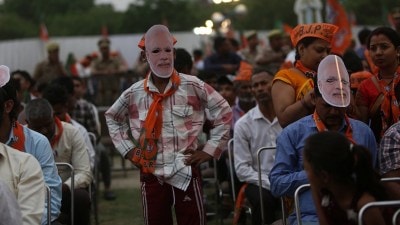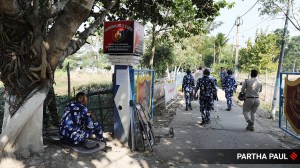- India
- International
Housing for students in Delhi: Struggle for hostel, affordable accommodation
In DU, the challenge to house outstation students has grown in the last 20 years. Students who do not get hostel seats are forced to hunt for affordable housing, which is easier said than done.
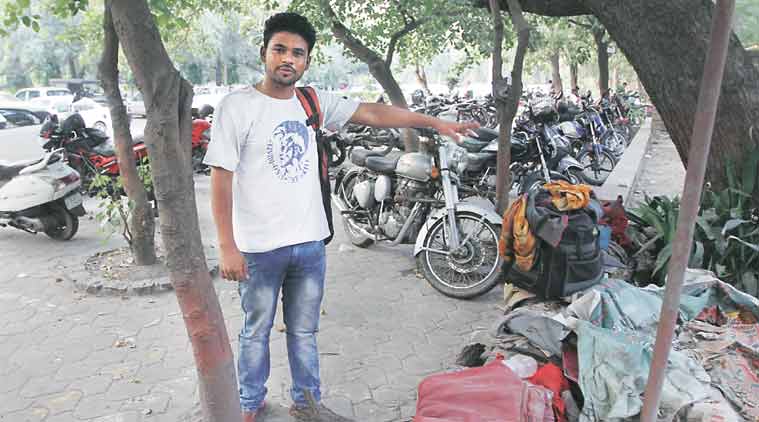 Ajay Singh Sikarwar slept in shelters for the homeless and footpaths after arriving from Madhya Pradesh to study in Delhi. Later, a senior student came to his aid. (Express Photo: Prem Nath Pandey)
Ajay Singh Sikarwar slept in shelters for the homeless and footpaths after arriving from Madhya Pradesh to study in Delhi. Later, a senior student came to his aid. (Express Photo: Prem Nath Pandey)
As his classmates would gather their books and head home after college, Jasman Singh Maurya would fish out his security guard uniform from his bag, preparing for his night job. Maurya, son of a farmer in Madhya Pradesh and a former student at Delhi University’s Kirori Mal College, worked evenings and nights as a security guard in an ATM for three years so that he could have a roof over his head at night. He still couldn’t get his bachelor’s degree. This was five years ago, but not much has changed since.
DU, which gives admission to at least 60,000 students each year and has a minimum regular student strength of 1.8 lakh in any given year, has only 6,040 hostel seats for students. This forces many poor students who do not get hostel accommodation to live with friends or relatives, and if all else fails, on the footpath.
This problem also rears it head at Jawaharlal Nehru University, which can house 6,625 students though it has a student strength of 8,700. The two research students of JNU who pitched tents outside the administration office because they had nowhere else to go, point to flaws in the university’s system.
Read | Without a hostel seat, what some students have been forced to do
The problem, many say, started in 2008 with the 54 per cent expansion in seats in courses to ensure accommodating OBC reservation. While seats in academic courses increased, hostel seats did not increase correspondingly.
Why can’t Delhi house its students?

Both DU and JNU were envisioned as residential universities. While JNU is supposed to be a fully residential university, the administration says it is not possible with the present infrastructure. “The intake of students and the number of hostel seats available are not equal. Further, all the students are not entitled for the hostel or are not on the priority list of the allotment… Such as students from the NCT of Delhi (local students), students who have joined a course for the repetition of the same level of a degree, etc,” says JNU vice-chancellor M Jagadesh Kumar. While two hostels and five dormitories have been built in JNU since 2008, increasing the number of seats, “it is not sufficient enough to accommodate the increased intake”, he adds.
Last year, JNU started more courses, but the strength in hostels remained the same. While there were 89 courses being offered in 2015-16, this year the number jumped to 113. It is not widely known, but DU was also supposed to house all its students. The Delhi University Act 1922 recognises the need for students to stay in or near the campus and its Section 33 states, “Every student of the University (other than a student who pursues a course of study by correspondence) shall reside in a College a Hall, or under such conditions as may be prescribed by the Ordinances.”
According to university experts, however, it is only recently in the University’s 94-year history that hostel accommodation has become a big challenge. In the past 20 years, the challenge to house outstation students, especially undergraduate students, has emerged and grown.
“If all of India comes to study in Delhi, this is the only thing you can expect,” says Dinesh Singh, former vice-chancellor of DU. It was during Singh’s tenure that the Dhaka Hostel complex, with the capacity to house about 1,500 women was started. “Aspirants are dissatisfied with the quality of education in other parts of the country. Delhi can’t house the whole of India. At the bottom of it, if you provide quality education at the regional level, a student will not be forced to leave home and come to Delhi but no one has done that,” he adds.
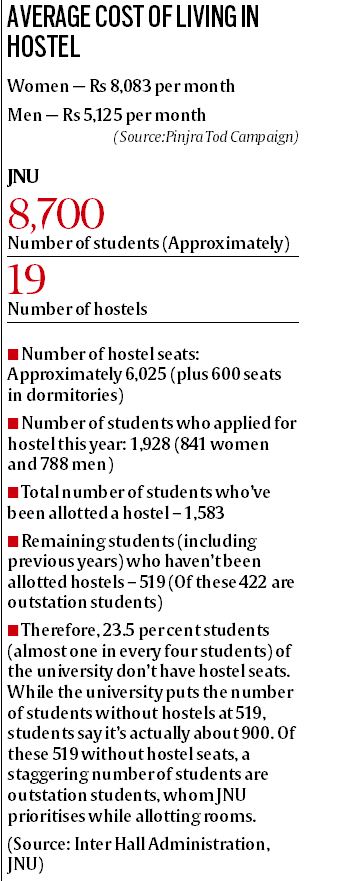
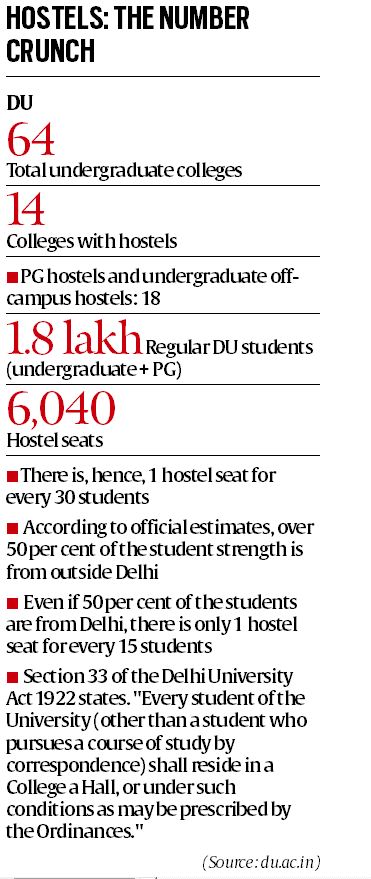
Problem areas for DU, according to former VC
Deepak Pental, who was vice-chancellor of DU between 2005 and 2010, says, “DU does not have land and does not get any support. We had suggested that the university grow vertically so that we could have more rooms in the same amount of space, but the proposal was rejected by the urban planners. They don’t understand what the university needs. A lot of India’s bureaucracy studies in DU but they have no love for it.” Getting permissions and clearances for a new building can take years. It took Shri Ram College of Commerce seven years to get all permissions to start building a new hostel block for women. By the time all the permissions came in 2014, the estimated cost of the project had jumped from Rs 2 crore to Rs 5 crore.
What it means for students
The struggle to get affordable accommodation prompted former DU student Praveen Kumar to go on a 10-day hunger strike in 2014, demanding that the rents in the 4-km radius of DU be regulated. Since then, the Right to Accommodation movement, started by Praveen Kumar and a few others, has filed a PIL in the Delhi High Court, demanding that the university build hostels to house all outstation students, provide a stipend to those students who do not get hostel, turn single occupancy rooms to double occupancy, and declare the area in and around the 5-km radius of DU as a special students’ zone where a minimum house rent is fixed for students.
Most universities and colleges in western countries rent homes and apartment buildings and offer them to students as hostels. Students have demanded that a similar model be followed by colleges and universities in Delhi as well.
At JNU, any student who does not perform well risks losing hostel accommodation. Students with a lower rank or those from Delhi NCR are the first to lose out. “Hostel allotment is based on Rank/Merit, reservation and priority. All foreign students and PwD categories students (differently abled) are allotted hostels on application. Allotment is done on the priority basis; (PI), who are coming from outside of Delhi; (PII), who have pursued/ are pursuing similar courses; (PIII), local students (NCT area) and those with long gap period. Normally, PIII categories students are not provided with hostel facility due to scarcity of the hostel seats,” says VC Kumar.
The problem is exacerbated because of JNU’s 9B research scholars (who get extension to complete their PhDs), says the administration. VC Kumar says, “Nearly 350 PhD students are occupying rooms beyond the normal duration of the course (in 6th year of their PhD) under clause 9B.”
JNU has allowed students on the waiting list to stay with hostel residents, as second roommates in a single-seated room, or a third roommate in a double-seated room. They have also constructed dormitories to fit as many students as possible. While facing criticism from some students for both these steps, the administration says it is the best it can do given that JNU needs to deal with a series of clearances, on account of being in the Ridge area.
***
What principals say
* Space is the biggest issue when it comes to building hostels in Delhi University. It took us quite a lot of time to identify a place for a girls’ hostel but we finally managed. Many others are facing a similar problem, I am sure. I think a hostel should be made mandatory in all new buildings that come up even if colleges have to offer a couple of courses less. I meet several students, especially women, who have to forgo admission in the college because we don’t have a girls’ hostel. Hostels are important not only for those students who come from outside Delhi but also for those who live in Delhi-NCR, but at a considerable distance from their college. A student who lives in Gurgaon and studies in North Campus will be very stressed out. The semester system is very demanding, students have to thrive in a very competitive environment. The situation is worse for students from the northeastern states, as finding safe accommodation is an additional problem they have to face.— Rama Sharma, Hansraj College
* There was a time when a majority of students who studied in DU colleges were from Delhi but now, in our college, at least 60 per cent of the students are from outside Delhi. Hostel accommodation is a big issue and most colleges don’t even have a hostel. We recently built a girls’ hostel and faced many problems which are common to others in North Campus, including getting permissions from several authorities, finance, getting permission to build in buildings with a heritage tag and meeting running costs. The most important thing that is needed is a single-window clearance system for permissions to build hostel complexes.— Anju Srivastava, Hindu College
* Since the clause that asks the university to provide residence to all students is part of the Delhi University Act, it is important for the top-most authorities to pay heed to the problem. We need to ask what are the efforts being made by the university to tackle the problem? What are the Ministry of Human Resource Development and the University Grants Commission doing? As of now, a large number of students are living in PG accommodations and on rent. Till the university cannot make arrangements for them, the least it can do is regulate the rent in areas around colleges and the university. Tell students where they can get safe accommodation and good food. A dean especially looking into these matters should be appointed. Someone will have to adopt this issue as their baby to make sure things move in the right direction.– Rajendra Prasad, Ramjas College
Apr 25: Latest News
- 01
- 02
- 03
- 04
- 05











